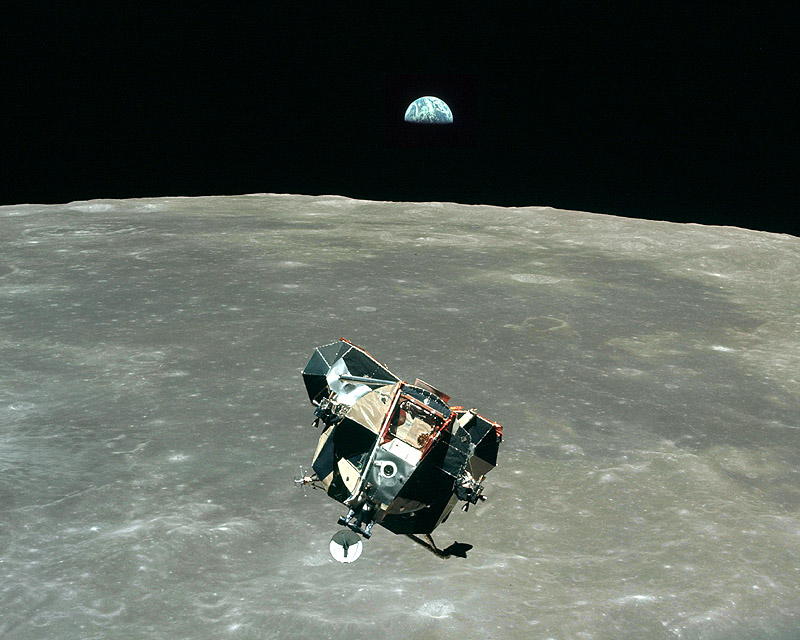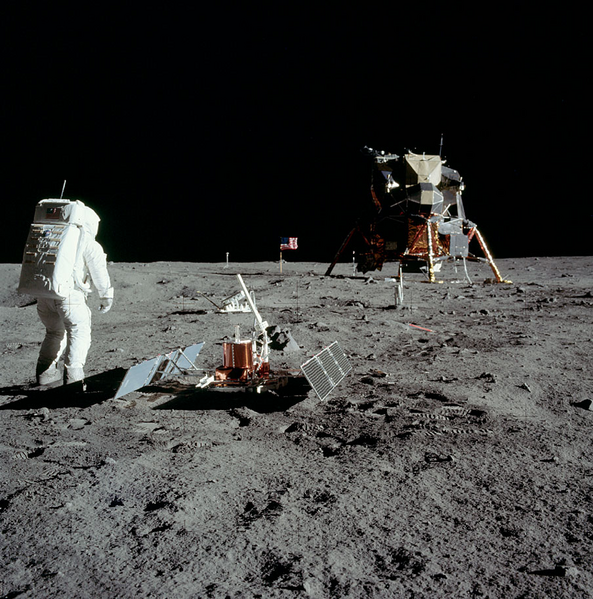It Was Beautiful from Here, Tranquility
/Hey Houston, that may have seemed like a very long final phase. The AUTO targeting was taking us right into a football-field size- football-field sized crater, with a large number of big boulders and rocks for about... one or two crater diameters around it, and it required a ... in P66 and flying manually over the rock field to find a reasonably good area.- Tranquility Base, minutes after the successful touchdown of the LM.
On July 20th, 1969, humanity took its first steps on a different world. Neil Armstrong's iconic words still ring true today, as the moment represented an enormous step forward for humanity. Apollo represented the pinnacle of scientific, economic and philosophical achievement for what the human race was capable of, and has transformed the world that we live in.
Four days earlier, Apollo 11 blasted off from the Kennedy Space Center, and would reach the moon just days later, following the path that had been blazed before by Apollo 8 (which had been the first human spacecraft to escape earth orbit and circle the moon), and Apollo 10, which served as a dress rehearsal for the Apollo 11 landing, with the Lunar Module coming within 8 miles of the surface of the moon, in May of 1969.

Upon reaching the moon on July 19th, Astronauts Armstrong, Aldrin and Collins were able to observe their landing site, and on July 20th, Armstrong and Aldrin boarded the Lunar Module and separated from the Command Module, Columbia. After an inspection to make sure there was no damage. With this separation, a burst of air in the tunnel pushed the LM off a bit faster than calculated, which was noted by the crew. As the Eagle descended to the Lunar Surface, problems arose, with the computer becoming overloaded with information. The alarms were silenced, and the craft continued its landing. Because of the air burst, the Eagle was pushed off course, and as Armstrong looked outside, he could see that the computers that were guiding the ship in were bringing the lander towards a large boulder field. He took control of the ship and set a course that brought the ship flying over the landscape, with Aldrin calling out altitudes. Finding a spot, they landed with 25 seconds of fuel left in the tanks. The Eagle had landed.
The mission called for a five hour sleep period, but this was skipped, as the astronauts felt that they would be unable to sleep. After a long preparation period, Armstrong exited the landed and descended the ladder. A television camera captured his decent, with an audience of over 600 million people on Earth watching his first steps down onto the Lunar surface. With one step, Armstrong changed the world.
After landing, Armstrong grabbed a rock sample, and was soon after joined by Aldrin, who then planted the American flag on the surface and spoke with President Richard Nixon from the White House. From there, the astronauts collected rock samples, deployed scientific instruments for a total EVA time of two and a half hours. After their experiments and samples were deployed and collected, the astronauts reentered the spacecraft, slept and lifted off from the moon, for a total duration of over twenty-one hours. They rejoined the CM and by July 24th, they had returned home.

The Apollo mission was the fulfillment of decades of work in rocketry and spaceflight experiments, and was propelled along by the advent of the Cold War and subsequent arms race between the United States and the Soviet Union. For this reason, the Apollo segment of the US Spaceflight programs was probably more detrimental for the prospects of long term spaceflight than had it happened under other circumstances. President John F. Kennedy had stated in 1961 that the US would land on the moon by the end of the decade. With Apollo 11, that was accomplished, and the subsequent lunar landings gained far less attention, and the program was ultimately scrapped, and the entire focus of NASA shifted from an exploration mode to scientific one, as demonstrated by the Skylab program and later on, the Space Shuttle.
Apollo 11 remains one of the most dramatic elements of human spaceflight history, surpassing Yuri Gagarin's historic entry into space, Alan Shepherd's followup, and the numerous achievements that made up the space race. For a brief moment, the entire world was united as we stepped on the moon for the first time, 40 years ago. In a recent documentary, In The Shadow of the Moon (not to be confused with the wonderful book by the same title), astronaut Michael Collins noted that people around the world often said "We did it." Not "You Americans did it." What the United States had accomplished was extraordinary, surpassing borders and politics. There is no modern equivalent, I think, that we will ever see in our lifetime.

I have my reservations about Apollo, especially when it comes to long term manned spaceflight, but for that one moment, with those words, Armstrong and Aldrin changed the world, which makes up for everything in such elegance and imagination. We have gone to the Moon, and I have to wonder, when will we return?
